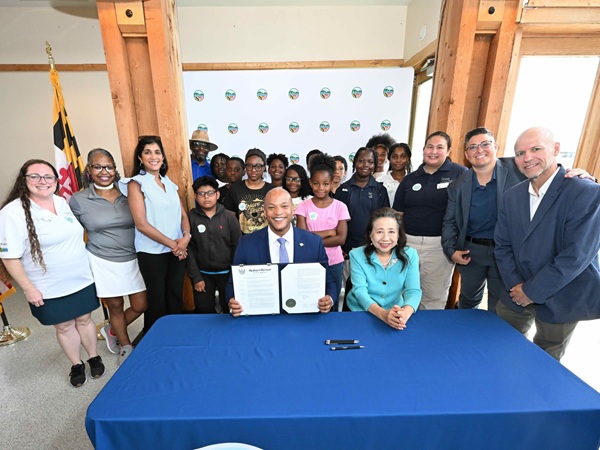ANNAPOLIS, MD—Maryland Governor Wes Moore signed an executive order over the weekend aimed at unifying the state’s approach to promoting environmental justice and addressing pollution burdens in historically underserved communities.
The “Valuing Opportunity, Inclusion, and Community Equity” (VOICE) order is designed to foster a “whole-of-government” strategy, emphasizing meaningful engagement with communities disproportionately affected by environmental pollution.
“Every Marylander deserves access to clean air, clean water, and resilient communities. That’s what environmental justice is all about,” Moore said at the signing ceremony in Baltimore City. “The order marks the next chapter in our work to cut exposure to pollution, improve access to clean public transit, reduce urban heat islands, and uplift neighborhoods that have been left behind.”
Moore was joined by Maryland Department of the Environment (MDE) Secretary Serena McIlwain, Delegate Jazz M. Lewis, environmental advocates, students and business leaders.
“Creating a cleaner Maryland requires us to listen to the people impacted by pollution,” said McIlwain, noting MDE’s efforts in improved outreach, stricter permitting, and increased transparency.
Key provisions of the executive order include:
- Increased Resources for Underrepresented Farmers: State agencies are required to identify and implement mechanisms to reduce barriers such as land access and financing for historically underrepresented farmers.
- Reinforced Agency Roles: The order reinforces the role of various state agencies in advancing environmental justice, from urban agriculture programs at the Maryland Department of Agriculture to community health initiatives led by the Department of Health.
- Designated Environmental Justice Officers: Each agency must designate an environmental justice officer and publicly available a biennial environmental justice strategic plan with tailored metrics.
- Interagency Advisory Council: The order creates the Interagency Environmental Justice and Equity Advisory Council to coordinate efforts, support local governments and maximize funding opportunities in coordination with the Commission on Environmental Justice and Sustainable Communities.
A critical component of the order mandates that state agencies utilize MDE’s MDEnviroScreen mapping tool. This tool provides detailed demographic information, tracks disparities related to environmental hazards, exposures, risks and health outcomes, and generates a score combining pollution levels with population vulnerability. The tool will help policymakers assess environmental burdens and target resources.
“This executive order is a promise to the families in Capitol Heights, Lexington Park, here in Baltimore, and across all of Maryland—that environmental justice is no longer optional, it’s essential,” said Delegate Jazz Lewis.
The Moore-Miller Administration has already taken steps to advance environmental justice, including MDE appointing its first-ever assistant secretary for environmental justice and providing over $2 million to communities for initiatives like tree planting and air monitoring.
“This is the first of what I anticipate will be many steps down the path toward achieving environmental justice for all who call our state home,” said Vernice Miller-Travis, Co-Founder of WE ACT for Environmental Justice.
Kim Coble, Executive Director of the Maryland League of Conservation Voters, lauded the order as “exactly the kind of bold environmental justice leadership Maryland needs.”
“Environmental justice does not belong to a single state department, but rather it demands a coordinated effort and response among all state departments across government given the interconnectedness of the subject,” said Delegate and Environmental Justice and Sustainable Communities Commission member Regina T. Boyce.
Camille E. Burke, Chairwoman of the Maryland Commission on Environmental Justice and Sustainable Communities, emphasized that the order is “not about policy—it’s about people.”
“Maryland Latinos Unidos applauds the VOICE Executive Order as a critical step toward equity and resilience for the Latine community across the state,” said Gabriela Lemus, Executive Director of Maryland Latinos Unidos.
Photo via the Maryland Governor’s Office


